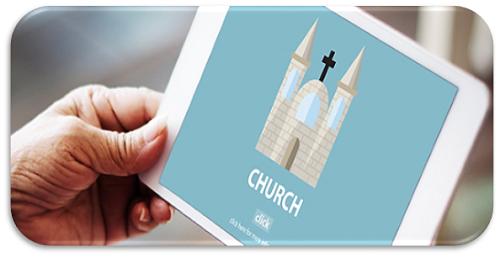The Church and the Internet
The Church and the Internet

The keynote of Queen Beatrix’s Christmas speech was the importance of ‘genuine contact.’ It was an outstanding message that could just as easily have been addressed to a church congregation. How gratifying to hear from the queen in person how she sees her life and government in the light of Jesus’ love.
In today’s times she sees it as a challenge for us all to reconnect the individual and the community. People are very busy with themselves: their world is narrow. But remarkably, this is taking place in a world that is full of the internet, which should be a wide world. It is indeed wide with respect to the information available, but it also brings loneliness, for everyone is sitting in front of their own computer screen. People communicate with quick, short messages. The internet is all about calling out at random and zapping all sorts of information together, but the person behind the internet is not seen. “Palpable closeness is needed, genuine contact through deeds and words”, is the message of Queen Beatrix. Her speech, unfortunately, was forthrightly denounced publicly, as is prone to happen in Holland. Yet she is right. She is quite well informed and can call upon many sociologists to corroborate this development. The internet appears to span all distances, but in the meantime the average Netherlander knows more about president Obama than about his own next-door neighbour. That genuine close contact is being lost. Even though you might have hundreds of ‘friends’, the internet is impersonal. For you can just as easily ‘unfriend’ them all, can’t you? Wasn’t that the word of 2009 – to unfriend?
Pillar and Network⤒🔗
We used to have our own ‘pillar institutions’, alongside all the other pillars in society. You felt at home with your brothers and sisters, you stood for the same things and knew how to reach one another. We need not romanticize this, as if it was always so wonderful, but there was clarity, connection and recognition.
These days it is the network that is important, but that is something quite different from a pillar. With a few clicks you enter some domain on the net, look around, react to something, take what is to your liking and disappear again, unnoticed. This has little to do with connection or commitment. You do not even see one another. The pillar gave us a community, call it the community of saints, in that people accepted a certain responsibility for one another, with a view to God. But a network is flighty; it offers no security. Everyone looks out for himself and makes his own choices.
A community recognizes boundaries. It is clear who belongs and who does not. Faith and unbelief are two separate worlds. But such boundaries are not present in the worldwide web network: everything lies open for all to see. You can join anything you like without anyone seeing you.
We cannot begin to conceive what this means to the church as a community. It is a different way of life altogether.
Another World←⤒🔗
The internet inspires fickleness: we click content towards ourselves and click away when we are not interested. That can also become a lifestyle attitude in the church. Everything that pertains to organization and sound union is simply ‘zapped’ away, because we would rather click on something that appeals to us. Speaking of shopping, the internet is all about consuming and in this it influences our lives.

This is noticeable in the practice of every day, e.g. in the fact that the new generation knows next to nothing about the most basic life rules in the church community. An attestation? What is that? Why should you apply for it? Isn’t a notification of change of address enough, even if moving to the other side of the country?
And what of a classis and a synod, in which we associate as churches and manage and maintain projects? They are quickly becoming unknown phenomena. Or what of the fact that we have accepted responsibilities together for a Theological University, for all kinds of relief and equipment projects, both nationally and internationally? It seems to come from another planet. What does a church council do? The internet generation has no idea whatsoever. It never ceases to surprise me. Church administrators have their hands full explaining what is normal protocol. Not only explaining but also convincing in the face of astonished reactions. Some time ago I watched a quiz on television. The question was: Who painted the “The Night Watch”? Nobody had the faintest idea. Someone was asked to point out Spain on the globe. After some searching the pin was stuck into Australia! Those are not small mistakes; this has to do with a lack of basic knowledge, not least caused by living in another world. Numerous items are clicked open continually and there is so much to comprehend — surely you can make your own choices? So it is in the world and in the church too, for that is today’s culture. When was the Belgic Confession written? In the adult youth group no one has any idea. You do not have to specify the year, but what period? Hesitant answer: during the Liberation...? No, it was in the times of the Reformation and the ‘Eighty Years’ War between Spain and the Netherlands. Have you heard of Calvin, of William of Orange and Alva? All I see are faces that look lost.
On the other hand, it is incredible what information they are able to collect by surfing the internet when it does interest them. I cannot beat that. And the contact they have in this way and what they learn, that is certainly not all negative. A generation of world citizens is growing up. The internet generation thinks in other dimensions.
Viewed from that perspective, I can in some way understand the indignant reactions of some to the Christmas speech. The internet also offers contact, even more so in fact. Yes, of course! People who know nothing of a national synod do pick up things from England and America: how people there live to God and sing and worship. Those are choices they make, which can be enriching. There have been moments when I too have looked lost when I heard of these things.
Who then is living in another world...?
Other Boundaries←⤒🔗
It is astonishing how easily people switch congregations. Sometimes they only send a message to the church administrators, a notification, no more than that. When challenged, they say something like: “We have been visiting this new congregation for a while and we like it”. Period. This really hurts me, and not only me. In the communion of the Lord’s Supper we devote our lives to God and to each other. Certainly, this happens in other congregations too, not to say anything negative about that, but that cannot be a reason just to exchange brothers and sisters one day. Ever since there has been an agreed acceptance of attestations between CGK and GKv and sometimes with NGK, it has only become easier. Many attestations are requested without a house move being involved.
It is also surprising how easily church members choose where they go to church. There are so many places where you can hear the gospel. Yes, indeed, thanks be to God! Nevertheless, church boundaries are functional, as are the boundaries of a church cell group under the responsibility of an elder: you cannot devote your life to all Christians at the same time, can you? If you do not concentrate on a congregation and/or a cell group, not much will come of fellowship and communal relationships. In practice, you will seek out Christians whom you like in the congregation, befriend them and so form your own smaller group.
It is absolutely astonishing, the fickle behaviour of people who do not wish to commit. As a result, home is either everywhere or nowhere.
When you get to know the workings of the internet, then you start to understand what is happening. This is where it comes from: being everywhere at once without commitment; getting what you need from everywhere without investing yourself; being together with no promises — for if you don’t like it you can just leave.

That discovery does not make the problem smaller, but bigger, for this is not something coming from a faction within society. This is our culture. We are all in it, and it permeates society whether we like it or not.
It does help to form a more discriminating view. In a new world you work with different boundaries. In the old world the boundaries were geographically determined. Whether someone lived on one side of the street or on the other could determine their church membership. That church boundary was ‘sacrosanct’, and issues could arise if a church council stood its ground, and they could have valid arguments for this. Today’s internet user, however, lives in a world in which that does not exist. The idea does not even enter into his head that moving house also entails changing his church membership. “Why then? What’s the problem?” For distances no longer exist.
This brings to the fore the question of what the real boundaries are that we should be defending. Are they the geographical boundaries? Or the historic ones (say, between NGK, CGK and GKv church denominations)? Or are those the boundaries between Christians and non-Christians? I think that the Queen’s analysis contained a good deal of truth. “Palpable closeness is needed, genuine contact through deeds and words.” By extension, it is also true that we need perceptible boundaries. A community that has no boundaries is not a stable community but one that is always ebbing away. You cannot devote your life to Christianity in a general sense: it must take real shape in your association with the Christians around you. Or to put it more accurately, to the neighbours around you. Queen Beatrix again: “Do we still know who is our neighbour? It is everyone who comes across our path: the fellow human beings in our life. But do we still see them?” Amen. Along with all the internet experience, it is important to stay close to home.
Other Ways←⤒🔗
Reading the Bible has become a problem in our times. People read less, and when they read, they hardly see what is written. I notice in the younger generation that they find it difficult to come into contact with the text.
Listening to a sermon is also difficult. The sermons have to be shorter. If there are guests or friends invited to the church service then you really cannot preach for longer than a quarter of an hour, twenty minutes at the most. One cannot listen to a longer discourse. And that is not only true of those from outside the church, but also of our own younger generation.
In time I have come to understand this. The manner in which these people are used to gaining their information is completely different from ours. Everything is being made visual, packaged in short fragments of text, presented interactively, and so on. Everybody’s opinion is sought. Listening is not practised anymore.
In the old days, we used to have Bible studies together, examining a text and asking ourselves what the exact meaning could be. Today we’d sooner start with our personal opinions on the text, what appeals to us and what we can do with it in our lives.
Nevertheless, I see signs of the tide turning. There is a great need for a clear and honest word from God to the heart of man. Also, always having to offer one’s own opinion gets tedious, and one cannot keep it up. One does not have that many opinions.
After a while one starts pretending and just says something to keep up appearances. All the noise and interaction can be a cover-up for personal emptiness and individual insecurity.
This leaves us with the question of what is the best way to bring the Word of God to the people. Firstly, the minister of the Word should take the recipient into account, or else it is not ministry, is it? Now that we have the internet generation in the church more and more, we are faced with the challenge of coming within their hearing range with God’s Word. The Word of God can find many ways to reach people; the half hour monologue is our own invention. In the meantime, I have noticed that giving opportunity to ask questions directly following the (short) sermon can be helpful. All sorts of personal thoughts then come to the fore that can give a welcome depth and/or balance, or at least offering the possibility of such. Just knowing that the opportunity is there helps towards a more interactive listening attitude during the sermon.

Challenge←⤒🔗
With all this in mind, I would like to return to the words of the queen: “Perhaps the greatest challenge is to re-connect the individual and the community and restore trust”.
It is not about denying the individual or labeling it negatively. Certainly not! For even though this whole internet development supplants traditional practices, there is still an element of truth that life is highly personal. Everyone is faced with making his or her own choice; no one can make it for them. At the same time, if you are continually only being approached individually, something is going wrong. Then you get lost in the possibilities. Man was created for relationships, so we need to be able to mirror ourselves to God and to each other. It is about individual and community. There was a time when the community was dominant and the individual was suppressed. Today it is the other way around: we must exert ourselves for the survival of the community before it is crushed. But in such a way that we still see the individual and acknowledge the importance of the individual. What we need is a church that is prepared repeatedly to be renewed by the Spirit of our God.
Do the church and the internet go together? When our saviour was born, the time that God had intended was ‘fulfilled’. We could not have computed this ourselves but we do see that all the Old Testament prophecies led to this moment. All the works of God were waiting for this development.
What is especially remarkable is that God had ensured open boundaries in the world as it was then known. The great Roman Empire brought unforeseen possibilities for the spreading of the gospel! Who would have thought it? Certainly, they were very hard times: people suffered greatly under the Roman Emperors’ lust for power. And yet, that moment was the fulfilment of God’s time. The world was groaning, but at the same time it lay wide open and the apostle Paul could reach out to many with just one language. Many Christians since have admired, thanked and praised God for this! That was then.
Now, in the end times, we look around us again with astonishment. In a very short space of time a web of internet highways has come into existence, bringing endless possibilities. The gospel can spread across the world at the speed of light. And the good news can branch out endlessly into websites in all continents. It was inconceivable.
That also causes increasing problems. All opposition against God can also make use of the same web. All suffering, injustice, crime and abuse from across the whole world comes to everybody’s screen, and no man can handle all that. The information overload makes people frightened and insecure. In the last article we saw how the great web causes people to live in different dimensions. It is a threat to normal life and personal contact with our neighbour, so we would not wish to idealize this development. The contrasts become all the more sharp and intense. Both cities, Babylon and Jerusalem, are being constructed in today’s world, and they both make use of all the tools that God has created, including the digital possibilities.
The Other Door←⤒🔗
As churches, we wish to be hospitable in this world, and to display something of God in so doing. We invite our friends and neighbours and open our doors so that even the passerby becomes curious. We take care that there is someone standing at every door to welcome guests and show them the way round, hand out a songbook and such like. We do all we can, for together we are the eyes, ears, mouth and feet of the Lord, to bring all sorts of people and their vulnerable lives into contact with the Lord. The entrance and the first impression the visitor receives is very important. It is right that we should pay attention to this.

But lately, every church also has another door to attend to! Not every church may be aware of it or feel responsible for it, but it is the case nonetheless. We are speaking of a digital doorway. Like it or not, the number of internet users is proliferating enormously, and users are also doing more and more on the internet. Shopping in a physical store is becoming outdated. The internet user surfs across the supplier’s website, fills his virtual shopping basket, pays at the digital cash register and in no time has all the articles right in his home. He does not even have to leave the house! And he does not see the shop interior at all. So every vendor today has a website that caters for the customers’ needs just as well as in the brick-and-mortar type of shop. It is the same with the sale of books, DVDs and all sorts of home appliances. Little by little, you can now buy just about anything with a click of the mouse.
Now, as churches, we can imagine that this does not involve us. We can defend ourselves on the principle that we are not a shop. But the fact is, that a large part of your target group is not walking around on the street but sitting behind a laptop somewhere and seeking entrance through that medium. The seekers do not come to visit your church building, but they do want to surf onto your website! Whether that is convenient for us or not, we must address the people where they are to be found (who was it that said that?).
We should pay as much attention to the church’s digital door as we do to a friendly entrance of the church building. There are people who measure the church’s value by the quality of her website, as they do with shops. You must be able to find information easily, something about the content, the organization and the activities. Preferably, the website should be as transparent as possible, with the option to make choices. If that does not work or the site stalls, the surfer disappears again. One click and he is gone. After all, there are plenty of other websites to discover.
Other People←⤒🔗
Not so long ago, I read somewhere that a minister had written in the church magazine that he no longer wished to receive any messages by email. The reason was clear: he was drowning in them. So he referred all who wished to speak with him to the telephone and old-fashioned writing paper. Although I can understand his problem, I do not sympathize with the solution.
The amount of email that one can receive can be a veritable plague. If every committee and person who does something in the church sends their reports with a Cc. to the minister, it will become impracticable. Add to that all the email sent by church connections and other networks and you really have to take draconian measures to continue to see your primary task as a pastor. I understand that, but tackle that specific issue and not the personal letters sent by email!
For we are dealing today with different kinds of people, who seek contact in the way that suits them. I can give an example from my own experience. A few years ago, I still lived in the outer suburbs of Zwolle, in a typical manse in an expensive neighbourhood, with a 15 m long driveway bordered by 8 m high conifers. Not that it wasn’t beautiful, but people only came there by appointment – understandably, because no one wants to come all that way for nothing.
These days I live in a normal neighbourhood with my study on the ground floor, with windows overlooking the street and a door that, weather permitting, is wide open. If I am at home, people can walk in, whoever they are, whether church members or not. In this way I have made all sorts of contacts, from outside the congregation as well as from inside. To my surprise, I got to know a whole class of people who would never have picked up the phone to make an appointment, but who just wished to drop by, spontaneously, a quick “in-and-out”. This latter possibility is especially important: whoever makes an appointment must stay seated for at least half an hour; but whoever just wanders in can also leave when he pleases. Not that he has to leave, but he is free to do so.

It is exactly the same with email messages. Sometimes they can be very personal, even though they are short and carelessly written. People who send such emails are not letter writers. Whoever writes letters anyway these days? Also, an email is less direct than the telephone. There is a generation growing up that only communicates digitally. So if you announce that you do not wish to be approached in that way, there is a likelihood that you will be missing an important part of your target group.
Paul became a Jew to the Jews and a Greek to the Greeks. Who are we then to remain the church leaders that we were twenty years ago? We are dealing with different people these days, with other ways of communicating, whether we like it or not.
Other Possibilities←⤒🔗
An elder from a neighbouring church regularly read the sermon when the minister was absent. He was surprisingly handy on his cell phone and had found a way to attract the attention of the youth sitting in the back rows. A modern cell phone is a wonderful toy: you can do all sorts of things with it during the sermon. Suddenly all the youngsters on the back row received a text message with the friendly request to pay attention. The sender was the sermon reader: he had their attention at once and they thought it was very cool. You see, we did not have this sort of possibility in the past! And that is just a minor example.
I find it very wonderful that church services on the internet can be followed all over the world. I see that as a great blessing of our God. Everyone is welcome in our service, of course, but the obstacle for outsiders to enter a church building is higher than we think. The internet user likes to watch and listen at home, and now he has that opportunity. He can listen in his own environment. Our church services are broadcasted live, which is also a blessing for the sick and for those who cannot leave their homes. And we also usually have church members abroad who can follow all the services via the internet.
Before the start of the church service the whole liturgy can be displayed. And afterwards people can react and ask questions through the website.
They can also click if they want personal contact. It is amazing! As a minister, I am also accessible in this way. That digital door offers unheard of possibilities!
It is important that someone with a good knowledge of communication maintains the site. We must not come over as a retail outlet. Every shop wants to sell, and it sings its own praises. A church does aim to promote itself, but praises her Lord and not itself. That is an important difference, and it requires expertise to construct a suitable website. How does a church present itself well, how does it speak? A church website is not a window display of self-righteousness. No, it is about the surfer experiencing that there is a message for him. We should not aim to enter into all possible discussions on our site, the aim is that someone receives answers to his or her own particular questions. So, however prodigious the possibilities are on the internet, keep it simple and personal. For that is timeless and irreplaceable.
In the meantime, we can learn by looking at attractive local church websites on the net, which offer a live sermon, a daily meditation, and where people are invited to join in activities.

Prepared to Change←⤒🔗
How flexible is the church? That is the question. A church that only looks inward will always be against new ‘whims’. For whoever has tasted the old wine, does not like the new. So let everything stay as it is. Or set up a simple website with a minimum of information.
The point is, though, that the Kingdom of God is as young as every age and bubbles like new wine. It is brewing within our society. We won’t be able to keep that in old wineskins: they will burst. New wine requires new skins. New possibilities to spread the gospel demand a flexible church. We do not offer the world our forms and traditions, but the living Word of God that is not limited by anything. We do not control that, but give ourselves into the service of God, who speaks and is not impeded by any boundary. If His Spirit sets out to search for people that are weaving around somewhere in the raging traffic on the internet highway, He will use us to this end. It does not get any easier, but the simple question is still whether we are willing to work with God. Remember, we are in the last days.

Add new comment